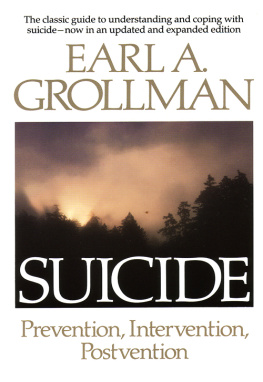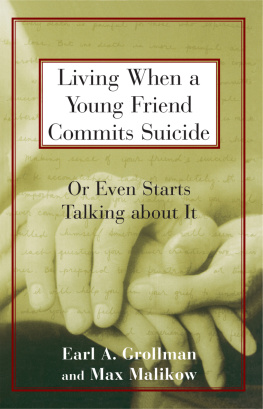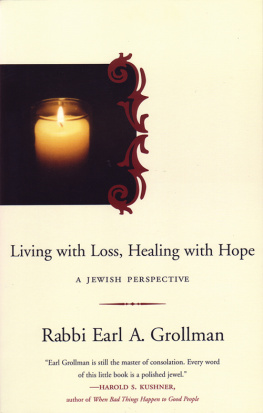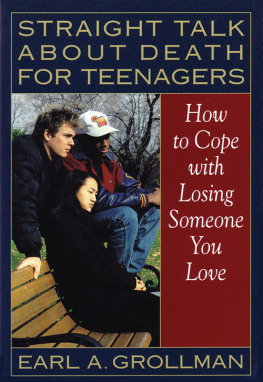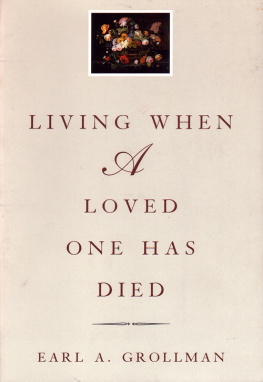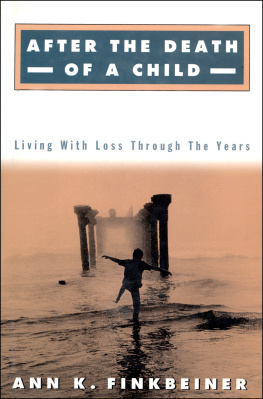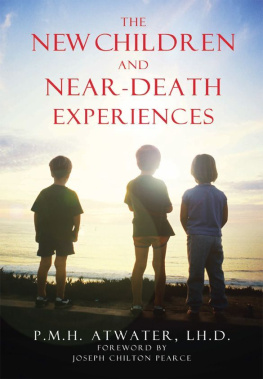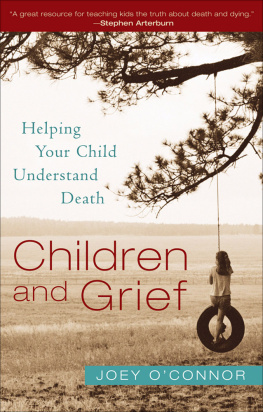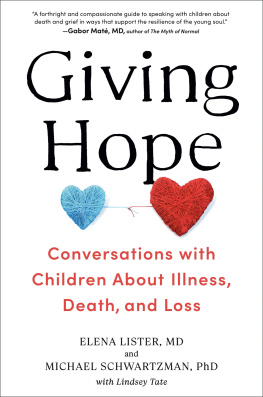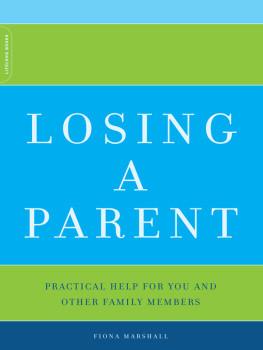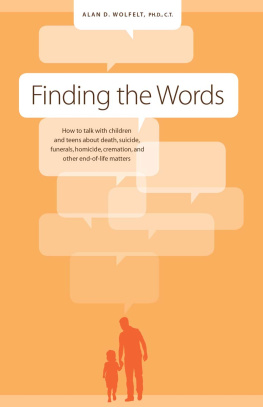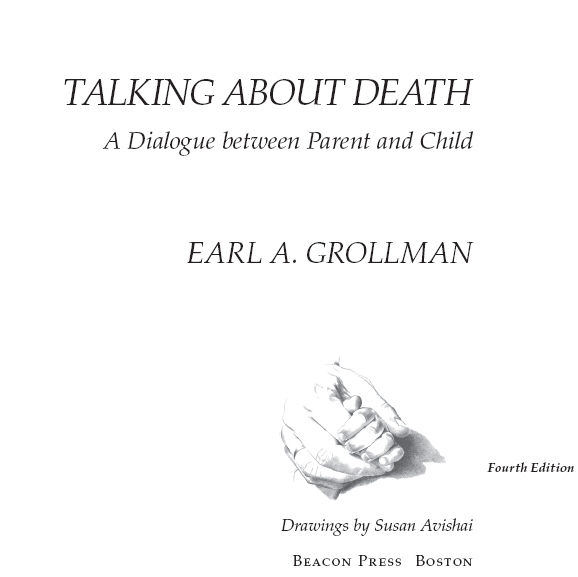
To my future:
Jennifer Rebecca
Eric Paul
David Aaron
Samuel Isaac
Rebecca Rose
Adam James
Joshua Paul
Charlotte Evelyn
Isaac Jace
Contents
I loved her so much. Why did she die?
Where does she go? Will I die, too?
One of the most difficult problems for parents is helping a child through the crisis of death. Youngsters feelings and perspectives are too often overlookedan understandable response in our still death-denying, death-defying culture. The word DEAD has become a new four-letter word. Most parents today are convinced that they should be honest in discussing the biological processes of birth, but when it comes to lifes end they may fall strangely silent.
In fact, most parents cannot recall how they told their children about the death of someone loved. The period surrounding the event becomes a blur. Adults struggling with their own grief do not believe a child can understand the tragic situation. A youngsters denial, silence, or sense of shock is too often taken to mean that the child does not understand that death has occurred and that children are not capable of mourning.
On the contrary. A child growing up today is more aware of the reality of death than you may realize. Grief is a deeply felt human emotion, as normal as playing, laughing, crying, or sleeping. Grief is a way of saying, I miss you, or, Im so sorry for all the things Ive said and done. When you avoid childrens reactions, you magnify their fears and replace reality with fantasy and psychological defenses.
This book is written with the hope that when death does occur, your child may be sympathetically guided toward an understanding of its real meaning. For the most effective results, you could first read the section Parents Guide to Explaining Death. Determine in advance the best method of interpreting the material: what points to emphasize, what lessons to be underscored. Those with religious convictions can supplement the discussion by sharing spiritual resources. In this dialogue, mention the specific name of the person who died.
When you read the book aloud, you may suddenly discover that you share the same emotions as those of the youngsters youre attempting to counsel. As Emerson observed in his journal, Sorrow makes us all children again.
Finally, I would like to express my love and appreciation to my daughter, Sharon, for her creative and expert assistance in helping me revise this book.
Youngsters continually encounter the fact of death in conversation and song as well as in the natural world of plants, animals, family, and friends. The question is not whether children should receive education about death, but whether the education they are receiving is helpful and reliable. Understanding death is a lifelong process that continues from childhood through old age.
Of the many ways of dealing with death, the one most surely doomed to failure is the attempt to ignore it. Tell your children immediately about a death in the family; they should not hear the news from an acquaintance. Delay makes it all the more likely that they will be told by the wrong person in the wrong way.
Approach the discussion gently and lovingly; the tone of your voice should be warm, sympathetic, kind. What is said is significant, but how you say it will have a greater bearing on whether youngsters develop morbid fears or will be able to accept, within their capacity, the reality of death.
Before you share the Read-Along section with children, try to make sure that the house is relatively quiet and that there is ample time to be alone with them. It is neither necessary nor desirable to read the section in one sitting. Most youngsters could not possibly absorb all the information at once. Proceed gradually, according to their intellectual and emotional capabilities.
Pause from time to time to let them express what they feel and ask questions. Allow them to reveal their innermost fantasies and fears: Will the person who died ever come back to life? Am I being punished because I did something wrong? Why didnt he even say good-bye to me?
Permit them to vent the emotions of grief; anger, tears, guilt, despair, and protest are natural reactions to family disorganization. They may cry at nothing and laugh at everything. They may express hostility as well as affection. Grieving in any form is a necessary healing process.
You may be asked to repeat an explanation. Even an adult who first experiences a terrible crisis says, I dont believe it. Its a nightmare. It cant be true. So gently say it again. Denial is their way of coping with and working through a difficult situation. You may want to ask that they repeat what you have just explained.
On the other hand, a parent need not offer more information than the child is really seeking. A satisfactory response to the question What is death? should not be an involved theological or medical explanation but a simple, factual reply: A person does not breathe. The body is still, quiet, peaceful. Many parents project their own unresolved problems upon children. Over-answering reflects your own anxiety. A complicated answer results in confusion and distraction.
Children often mistake the meanings of words and phrases. I was once asked by a young girl, How long is death? I responded, Death is permanent. The youngster said, Oh, then its not so bad. Noticing my bewilderment she said simply, My mother has permanents at the hairdresser. It doesnt last very long.
Children often ask questions to test parents. Before answering, adults should try to explore the progression of thought that led to the childs inquiry. Otherwise, the reply could be misleading. When a boy was told that his grandfather died because he was old and sick, the child became preoccupied with his parents health. He would cry whenever his mother or father had a simple cold. He discovered convenient reasons to stay away from nursery school and remain at home. How do you feel? he would ask again and again. His parents were irritated, not understanding that their son was convinced that their own deaths might soon occur. To the child, his parents were old as well as sick. What the boy needed to hear was that his parents illness was different from that which caused the death of his grandfather, and that his parents would get better.
Dont tell your children what they will need to unlearn later. Avoid fairy tales and half-truths. Imaginative fancy only gets in the way when they are already having enough trouble separating the real from the make-believe. Youngsters need direct, simple, and honest age-appropriate information about death.
It is OK to admit that you dont have all the answers. There are no simple, foolproof answers to the mystery of death. Adults as well as children differ more widely in their reactions to death than in their reactions to any other human phenomenon. There is no magic procedure that will comfort all people, either at the time of death or during the period that follows. Grief and adjustment do not work on strict timetables. While one person will pick up the threads of life and work out new patterns relatively quickly, another will find, even after a longer period, little discernible movement toward a meaningful future.
While we all grieve at a different pace, almost all of us eventually go on with our lives.
Guidelines for Helping Children Who Have Experienced the Death of a Loved One
A decalogue for the concerned parent
I. Do take the word death off the taboo list. Allow it to become a concept that can be discussed openly in the home, the school, and the place of worship. The question is not whether children should receive death education but whether the education they are receiving is helpful and reliable. Understanding is a lifelong process that continues from childhood through old age. Death education begins when life begins.
Next page

